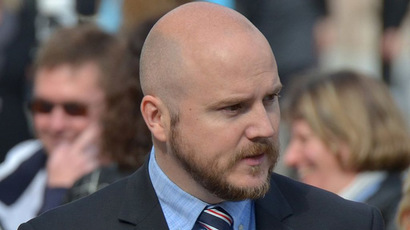Power shifts to left after Sweden parliamentary election
A change of power is expected in Sweden after eight years of conservative rule, with the center-left opposition getting a lead over the governing center-right, just short of an absolute majority, according to partial official results.
The Social Democrats are the largest party, taking an election lead with just over 31 percent, according to the latest national broadcaster Swedish Television exit polls. The Green Party won 7.1 percent and the Left Party took 6.6 percent. Thus, the left leaning opposition bloc has received a total of around 44.8 percent – and is projected to win 160 seats in the 349-seat Parliament.
The ruling coalition would secure only 142 seats, according to projections based on the nearly 5,000 of the just under 6,000 districts counted.
Swedish Prime Minister Fredrik Reinfeldt acknowledged his alliance’s defeat and said he would step down.
“The centre-left has more seats than the Alliance,” Reinfeldt told party supporters. “So tomorrow I am going to hand in mine and my government's resignation.”
The center-left Social Democrats are basing their political program around pledging increased jobs, education and healthcare spending. They plan to allocate some 40 billion krona ($5.6 billion) of funding ot the projects.
With a majority, the Social Democrats would form a coalition government with the support of the Green Party or the Left Party, and Social Democrat Stefan Loefven could become the next premier of the largest northern European country.
Yet now the opposition is unlikely to get a clear majority in the 349-seat legislature, thus complicating the parliamentary situation.
"All the signs point to the fact that the center-left are going to be bigger than the Alliance, but that they won't get a majority," Mikael Sundstrom, a political scientist at Lund University, told Reuters, describing the situation for the Social Democrats as “very difficult.”
Far-right parties are also gaining more support: the Sweden Democrats, who aim to cut asylum seekers by 90 percent, are expected to double their vote in Sunday’s parliamentary polls and get almost 10 percent, according to the Novus survey. Sweden expects up to 80,000 asylum-seekers from Syria, Eritrea, Somalia, Afghanistan, Iraq and other countries, the highest figures since 1992.
The elections are taking place as many Swedes are concerned that the current right-wing Alliance government has undermined the welfare system, cut income and corporate taxes, abolished a tax on wealth, trimmed welfare benefits, eased labor laws and privatized state-owned companies, AP reported.
Unemployment is currently at 8 percent, mainly affecting the youth and the immigrant population.
The gap between rich and poor has grown faster in Sweden than in many developed countries, despite its remaining one of the world's most egalitarian states, according to the Organization for Economic Cooperation and Development (OECD).
Sweden’s current Prime Minister, Fredrik Reinfeldt, who took office in 2006, is the country’s longest-serving conservative leader.














